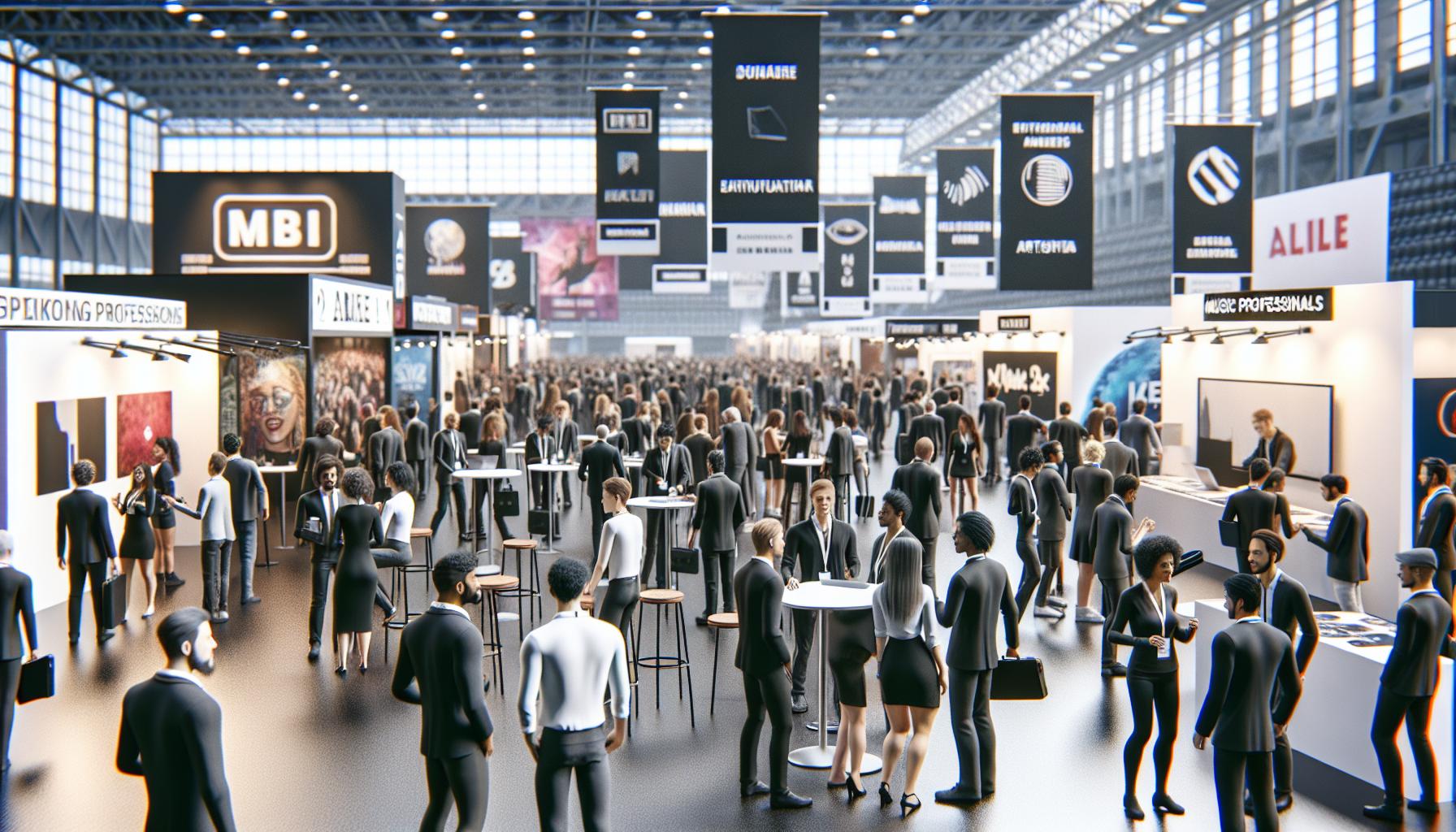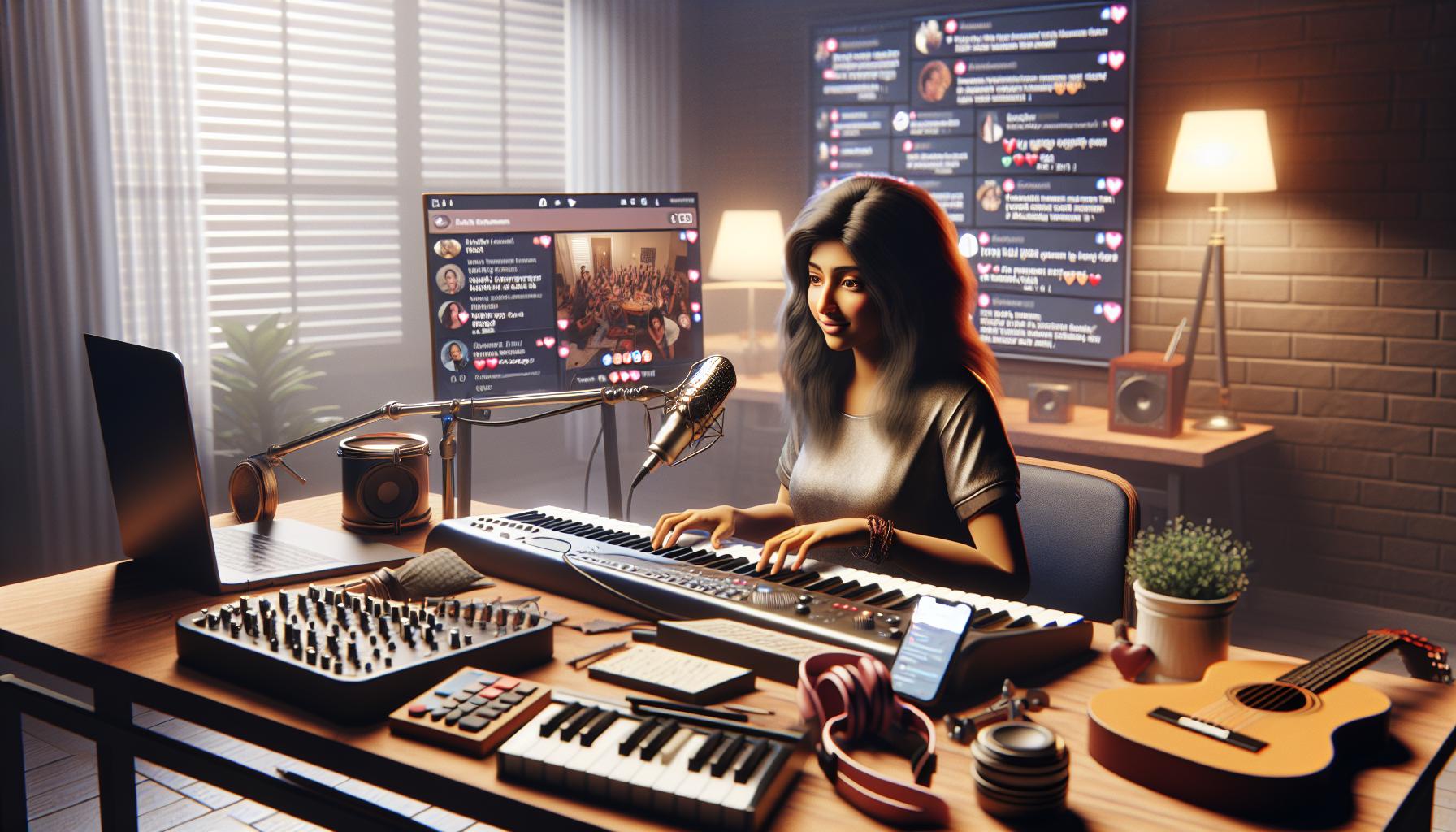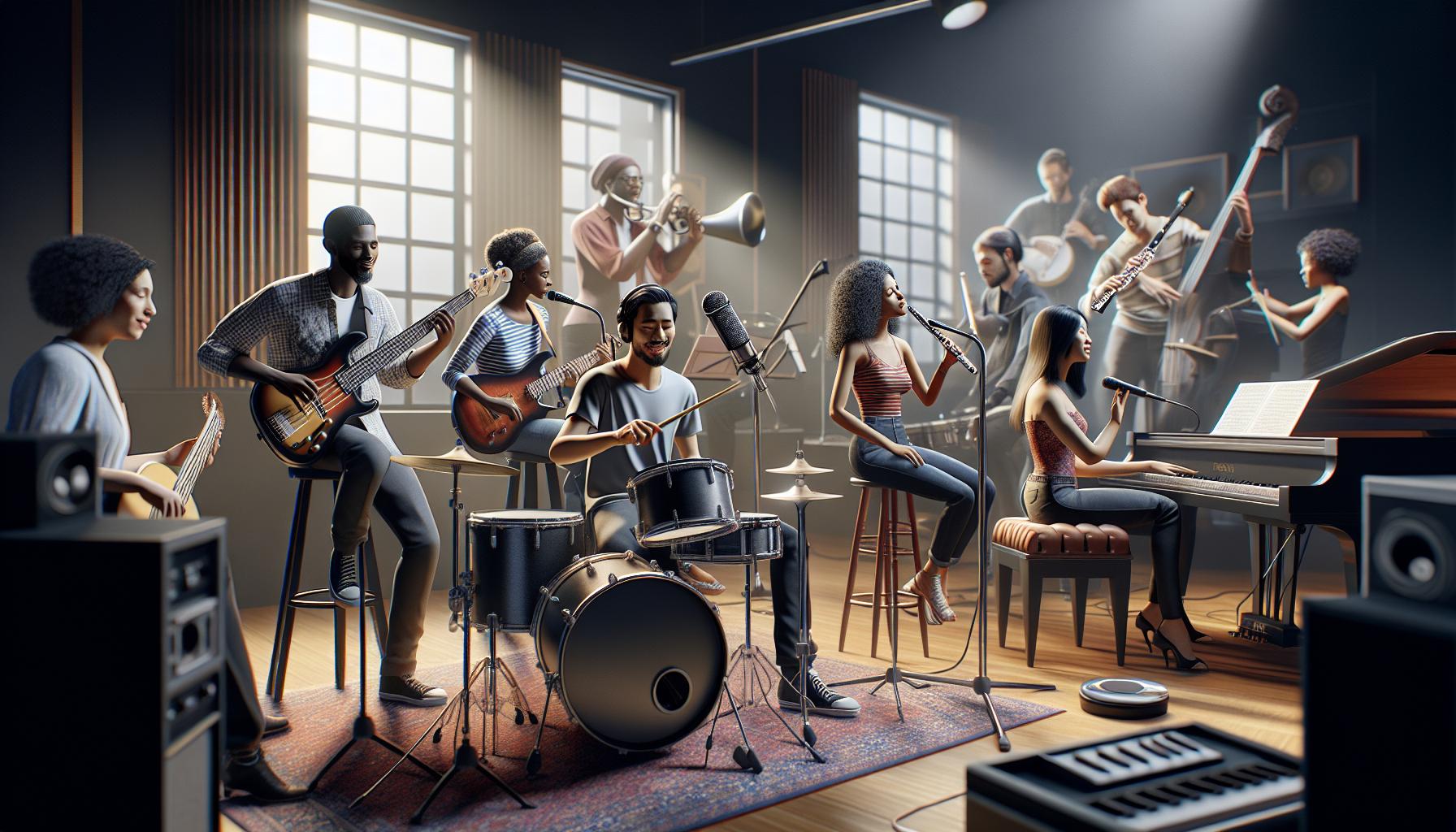In the music industry, it’s not just about what you know, but who you know. Building a strong network can be the key to getting your foot in the door and scaling the heights of this highly competitive field. I’m here to share my insights on how to effectively network in the music industry.
Networking isn’t just about schmoozing at parties or handing out business cards. It’s about building genuine relationships with people who share your passion for music. It’s about helping others and in return, opening doors for opportunities that you might not have had access to otherwise.
So, let’s delve into the art of music networking. Whether you’re a budding artist, a seasoned musician, or someone who just loves the industry, this guide will provide practical tips and strategies to help you build a network that can propel your music career to new heights.
Contents
Why Networking is Important in the Music Industry
Have you ever asked yourself, “Why is networking crucial in the music industry?” Let me tell you, it’s as valuable as your musical talent. Networking can mean the difference between a successful career and a struggle in obscurity.
In the music industry, it’s often said, “It’s not what you know, it’s who you know.” Yes, you heard it right! It’s the connections and relationships you establish that can open doors to significant opportunities. Bridge-building with industry professionals, fellow musicians, and fans can lead to collaborations, gigs, or even record deals.
Being part of a network also means you’re an active member of the music community. The music industry is built on partnerships and collaborations. Deciding to network means you’re choosing to be part of that collaborative spirit. Sharing ideas and experiences with people who understand your journey can be enriching. It doesn’t just help you grow as an artist, but also as a person.
Networking isn’t just about furthering your career. It’s also about mentorship and learning. As you grow your network, you pick up advice and knowledge from experienced industry professionals. This can help guide your creative process and strategic decisions.
Online platforms like LinkedIn, Bandcamp, and SoundCloud have made it easier than ever to make connections. But nothing can replace good old face-to-face networking. Music is a social phenomenon and networking requires a human touch. Attend concerts, music festivals, open mic nights, and music industry conferences. Be open, approachable, and genuine, and you’d make long-lasting connections.
A music career is rarely a solo journey. It’s a path filled with collaboration, mutual support, and shared milestones. So, don’t underestimate the power of networking in the music industry.
Understanding the Music Industry Landscape

In the midst of establishing your network it’s imperative to understand the current landscape of the music industry. The dynamics of this industry aren’t stagnant. They’re always on a roll transforming per the influence of several factors like technology, consumer preferences, and evolving business models.
Major players in this industry include Record Labels, Artist Managers, Music Publishers, Booking Agents, and more. While the roles of these parties might seem distinct, there’s a lot of mutual dependence. For example, an artist manager can’t successfully promote an artist without cooperating with a record label. Thus the mutual collaborations outline the Interdependence that’s critical in this industry.
Leveraging technology has become more evident than ever. Streaming platforms have not only revolutionized the way people consume music but also how artists generate revenue. However, while technology has opened up new opportunities, it doesn’t replace the value of human interaction. Face-to-face networking still plays a key role in building solid relationships.
In addition, Artist Development has become increasingly important in recent years. Record labels and other stakeholders are investing more in nurturing talent and developing artists. Knowing your worth and making sure you’re treated fairly in terms of remuneration and recognition, is key.
The landscape continually fluctuates and one can’t predict the exact trajectory. Therefore, to adapt to these changes, it’s always beneficial to build a strong network. A fresh breeze of mentorship from experienced professionals in the industry can provide a great boost to your career progression.
Finally, don’t underestimate the significance of being active in the music community. Many have found success not just by knowing the right people, but by engaging and contributing positively to the industry.
Identifying Key Players in the Music Industry

It’s crucial in the music industry to know who’s who. Not only does it help to understand the dynamics of the industry, but it also guides your networking efforts. Icons and influencers play vital roles, but there’s a galaxy of professionals behind the scenes enabling the magic to happen.
For starters, let’s look at the Record Labels. Often, they’re the kings and queens of the music industry. They fund the production, manage marketing tactics, and distribute the music. Yet, within the indie scene, artists are increasingly starting their own labels. It allows for greater control and, hopefully, a larger slice of the income.
Artist Managers are next. Like a compass guiding the ship, they helm the artist’s career, from managing day-to-day operations to long-term strategic planning. If you’re an artist, it’s critical to have a manager you trust, one who’s got your interest at heart.
And let’s not forget the Music Publishers. They handle the business of songwriting. Their prime role is to make sure songwriters get what’s due to them when their compositions are used commercially. They collect royalties and oftentimes help in the creative process, matching songs with artists and vice versa.
Finally, consider those machineries running in the background – Sound engineers, Producers, Tour managers, Booking agents, to name a few. They may not be in the limelight, but without their grit and grind, the music industry won’t spin like it does.
With this newfound knowledge, don’t amble aimlessly in your networking journey. Know your key players. Build genuine relationships. Be an active member. Only then can you find your place, make a difference, and possibly grab a slice of the star-lit music industry cake.
Attending Music Industry Events and Conferences

When discussing music industry networking, it’s impossible not to mention the significance of Industry Events and Conferences. These gatherings are like gold mines brimming with valuable networking opportunities. This is where I’ve found the cream of the music industry; from record labels to artist managers, sound engineers to music publishers, you’ll find them all.
I can’t stress enough the potential benefits these events offer. They’re not just social gatherings but platforms where ideas are shared, contacts made, and collaborations initiated. It’s not uncommon to rub shoulders with potential mentors or stumble upon an unexpected partnership.
One glance at the music industry’s calendar confirms the multitude of these events globally. Each offering unique networking avenues and opportunities. Key industry events like the Grammy Awards, SXSW Conference, National Association of Music Merchants (NAMM) Show, or the MIDEM conference are just a few examples.
Most importantly though, these events grant access to learning firsthand from seasoned professionals. Their insightful talks, seminars, or workshops are like masterclasses in various industry aspects. Often, just the experience of hearing veterans recount their journey can be incredibly inspiring and enlightening.
But remember, it’s not enough to just attend these events. The real value lies in how you utilize them. Be proactive, leave no stone unturned. Don’t shy from introducing yourself or starting conversations. Ask questions. Learn from others’ experiences. And most importantly – build genuine relationships.
Attending these events is also a significant way to show active involvement in the music community. They serve as platforms to not just observe, but also participate and influence industry discussions and trends.
Thus, making the most out of music industry events and conferences can be a defining factor in your music career. They are not merely networking platforms but career-changing life experiences. Remember, this industry thrives on relationships and collaborations. The right conversation at the right time can indeed kick-start or boost your music career. Aspiring and seasoned musicians alike should consider these events as one of their most crucial career investments.
Leveraging Social Media for Music Networking

In the digital age, social media has become a powerful tool for networking in the music industry. Platforms like Twitter, Instagram, and Facebook are not just for sharing cute cat videos anymore—they’re vital avenues for making genuine connections in the music community.
Let’s delve into why and how these online platforms can be utilized to strengthen your network in the music industry.
Building Authentic Relationships Online
Online platforms provide an opportunity to reach out to people in the industry you may not have the chance to meet in person. But remember—it’s not just about the number of followers or likes, it’s about creating meaningful, genuine connections. Just like in-person networking, online networking is about giving and receiving. It’s about engaging in discussions, sharing ideas, and showing support for others’ work.
Sharing Your Work and Showcasing Your Talents
Social media can also be utilized to share your own work and showcase your unique talents. Platforms like SoundCloud and YouTube can serve as a stage to not only share your music but to also gather feedback and engage with your audience.
Joining Online Music Groups and Forums
Online groups and forums provide platforms for discussions, sharing resources, ideas and establishing connections. Place like the r/Music subreddit on Reddit, or music discussion groups on Facebook can serve as great platforms to collaborate, learn and network online.
Staying Active and Engaged
Lastly, the key to social media networking is consistency. Regularly post updates, engage with your followers, respond to comments, and celebrate music community milestones. Remember, be real, be genuine, and let your love for music shine through in everything you do online.
- Social Media: A powerful tool for networking
- Building Authentic Relationships Online: Key to genuine connections
- Sharing Your Work and Showcasing Your Talents: Express your uniqueness
- Joining Online Music Groups and Forums: A platform for learning and networking
- Staying Active and Engaged: Consistency is key
Social media serves as a two-way communication channel, providing an opportunity to engage with your audience on a more personal level. It’s a tool that if used effectively, can open doors to countless opportunities. So start today, explore these platforms, and start building your strong network in the music industry.
Collaborating with Other Musicians and Artists

Building a successful career in the music industry isn’t just about creating great music; it’s also about collaborating with other musicians and artists. Collaboration is not only an excellent networking tool, but helps to expand your creative horizons, learn new techniques, and reach broader audiences.
Mutual growth and learning is one of the key benefits of collaborating. When I work with other musicians or artists, we’re able to learn from each other’s experiences and skills. Whether it’s a particular technique of playing an instrument, lyric writing style, or how to engage in live performances. We pick up some great insights while sharing our expertise as well.
Here’s something crucial to remember: True collaboration is based on respect. To earn respect, you have to show respect. Valuing the other person’s creative contributions is essential. We’re not in competition with our collaborators – we are there to create something amazing together. Collaboration isn’t just about taking; it’s also about giving – sharing your knowledge, skills, and ideas.
Let’s take a look at some popular collaboration platforms for musicians:
- Kompoz: A music collaboration platform that connects you with other musicians worldwide. Ideal for multi-genre collaborations.
- BandLab: A cloud-based music studio providing an array of production tools. A perfect place for music makers at any level.
- Soundtrap: Owned by Spotify, this platform offers an online studio for music production and podcast recording.
Including these platforms in your networking strategy can provide new opportunities for collaboration, increasing your visibility within the industry.
It’s obvious that collaboration involves some amount of digital interaction, but don’t forget about the value of face-to-face collaboration. Nothing beats the raw energy and immediate feedback you get while playing, singing, or brainstorming with others in the same room. Ensure to balance online collaborations with good old in-the-room jam sessions. Celebrate the melding of technology and human connection. It’s a fascinating dance.
There are more avenues for collaboration we’ve yet to explore – from song writing workshops to music festivals. It’s all part of building a vibrant, connected musical network.
Building Relationships with Music Industry Professionals
Establishing solid connections with industry professionals is a vital part of the networking playbook. It’s not just about having the right contacts in your phone; it’s about fostering a fruitful relationship with them. Music industry professionals, like record labels, artist managers, and publishers, can offer myriad opportunities and guidance in navigating the music world.
To begin with, active participation in industry events can really make a difference. Music conferences and festivals provide a platform to meet and interact with these professionals. It’s an excellent way to understand their work dynamics, share your music, and ask for advice or feedback. Music workshops and seminars are also unique places to learn from industry veterans and connect with them.
The power of mentorship shouldn’t be underestimated, either. If you find an industry professional willing to mentor you, seize the opportunity. They can share valuable insights, guide your music journey, and might help you avoid some common pitfalls. Remember, genuine relationships are based on reciprocation. So, offer help where you can, and keep the relationship mutually beneficial.
Don’t disregard the power of communication; it’s not a one-time thing. Regularly reconnecting with your contacts keeps the relationships alive and also opens doors to new networking opportunities. Simple gestures, like wishing them on special occasions or sharing your new music with them, can go a long way. Always remember, the key to successful networking lies in nurturing these connections, not just making them.
The increasing influence of social media in music networking can’t be overlooked. Platforms like Twitter, Instagram, and Facebook have become indispensable tools for musicians to connect with industry professionals. They provide an avenue to not only share your work and engage with these professionals but also learn from their online presence.
The world of music networking is dynamic and constantly evolving. Building relationships with industry professionals is a significant asset, but remember, it’s not an overnight process. It requires patience, persistence, and authenticity. As your network grows, so does your career potential. Stay resilient and continuously look for opportunities to learn and connect. Persistence is a trait shared among successful musicians, after all.
Nurturing and Maintaining Your Music Network
Building relationships, although a significant starting point, is only part of the journey. Once these powerful connections are established, it’s crucial to nurture and maintain them. Like a garden, relationships require care and attention to flourish and yield fruitful results.
One excellent way to do this involves regular communication. Now, this is not about spamming your contacts’ inboxes with daily emails. Quite the contrary, it’s all about checking in occasionally, updating them about your work and strides in your career or sending useful resources that you believe might help them in their work.
Remember, networking is a two-way street. Always aim to give as much as, or even more than, you receive. If you can offer help, advice, or an introduction to someone they’d like to meet, do so. It can be as simple as sharing their work on your social media platforms or even attending their shows and performances.
Being an active member of the music community is a must. How do you do this? Simple. Participate in music conferences, workshops, and festivals. By showing up consistently, you demonstrate dedication to your craft and commitment to the music community. Visibility is key. Constantly remind people of your existence but in a manner that doesn’t feel pushy or narcissistic.
Collaboration is the heart of the music industry. Working with other artists, both upcoming and established, is an exceptional way to not just make your name known in the industry but also to grow and learn as an artist.
Staying relevant, in this fast-paced industry, is crucial. I can’t underline this enough. By continually renewing your skillset and innovating your music, you ensure that your current network stays engaged while attracting more industry professionals towards your work.
In the world of music, there is never an end to learning and growing. Stay consistent, stay genuine, and remember, in the long run, dedication and authenticity always pay off.
Conclusion
Building a strong network in the music industry isn’t just about knowing the right people. It’s about fostering genuine relationships, being an active community member, and learning from seasoned professionals. While the digital realm offers a wealth of networking opportunities, face-to-face interactions still hold significant value. Balancing these two aspects can lead to a robust and vibrant network.
Leveraging social media platforms and online collaboration tools can help artists share their work, engage with peers, and broaden their audience reach. But let’s not forget the power of traditional networking avenues like music festivals and songwriting workshops.
Remember, nurturing and maintaining relationships is key to long-term success. Regular communication, mutual support, and active participation are crucial. As an artist, it’s equally important to keep innovating and refreshing your skills to stay relevant in this dynamic industry. So, let’s get out there and start building those connections!
